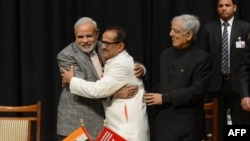India’s ruling Bharatiya Janata Party has come to power in a coalition government in Indian Kashmir. It is the first time the Hindu nationalist party will have a role in governing India’s only Muslim majority region.
After Mufti Mohammad Sayeed of the People’s Democratic Party took the oath as Kashmir’s chief minister, Nirmal Singh from the Bharatiya Janata Party was sworn in as his deputy in Kashmir’s winter capital, Jammu.
Prime Minister Narendra Modi watched the ceremony, described as “historic” because his Hindu nationalist party would share power in the Muslim majority state for the first time.
The BJP has never been a serious political player in Kashmir, which is claimed by both India and Pakistan, and where anti-India sentiment runs deep.
The two parties negotiated for weeks to stitch an alliance after elections held in November threw up a fractured result. While the regional People’s Democratic Party won in the Muslim-dominated Kashmir valley, the BJP got huge support in the Hindu-dominated Jammu region.
'The coming together'
The two parties are ideologically far apart but have bridged their differences and worked out a program that sets aside contentious issues.
Chief Minister Sayeed called it the coming together of the North Pole and the South Pole.
For the time being, the BJP has put on hold its long-standing demand that a special constitutional provision that gives Kashmir autonomy should be scrapped.
Satish Misra with the Observer Research Foundation in New Delhi said the alliance could help in integrating Kashmir with the rest of the country.
“The BJP, which has been an enigma for the state of Jammu and Kashmir, now BJP would try to woo the valley also," Misra said.
"Naturally, BJP would like its influence to grow in the valley, so BJP will have to moderate its stand, abandon its earlier position, so from that respect, Jammu and Kashmir will come closer to the mainstream,” Misra said.
Indian soldiers' powers
The PDP also did not push its demand to scrap a Draconian law deeply resented in Kashmir that gives Indian soldiers sweeping powers to search and shoot on sight in the state.
The new government said its foremost priority would be the state’s development.
Political analysts said there was skepticism in the Muslim-dominated Kashmir valley about Hindu nationalists having a role in governing the state.
But Noor Ahmad Baba, professor of political science at Kashmir University, said the skepticism was tinged with hope that the BJP’s participation would speed up development of the mountainous region and its recovery from devastating floods last year.
“A party that is in power in the center is going to partner in the government… that is also an opportunity,” Baba said.
'Turning point'
Soon after taking office, Kashmir’s new chief minister, Sayeed, said peace was a prerequisite for the state’s development, and he supported talks with Kashmiri separatists and a reconciliation process with Pakistan.
“We want to make this alliance a turning point in trying to meeting hearts and minds of people,” Sayeed said.
Some analysts said the BJP’s participation in the Kashmir government could clear the way for talks with Kashmiri separatists, with whom Prime Minister Modi’s government has refused to hold a dialogue.




